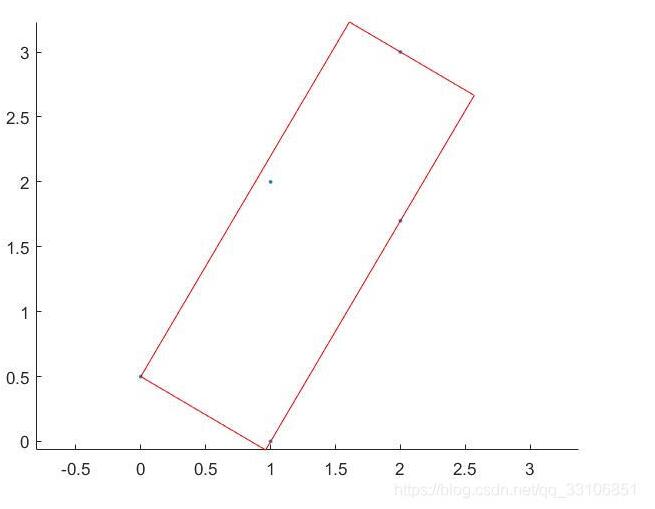C#求点集的最小包围矩形
C# 求点集的最小包围矩形,供大家参考,具体内容如下
思路:
1、求点集的中心点
2、将点集绕矩形进行一系列角度的旋转,并求记录旋转点集的包围矩形的面积和旋转角度;
3、将面积最小的矩形绕点集中心点旋转回去。
// 1.寻找多边形的中心
public XYZ GetCenter(List<XYZ> pts)
{
double sumx = 0;
double sumy = 0;
foreach (var p in pts)
{
sumx = sumx + p.X;
sumy = sumy + p.Y;
}
var pt = new XYZ(sumx/pts.Count(),sumy/pts.Count(),0);
return pt;
}
// 2.旋转多边形,针对每个点实现绕中心点旋转
public XYZ RotatePt(XYZ inpt ,XYZ centerPt ,double theta)
{
double ix = inpt.X;
double iy = inpt.Y;
double cx = centerPt.X;
double cy = centerPt.Y;
double Q = theta / 180 * 3.1415926; //角度
double ox, oy;
ox = (ix - cx) * Math.Cos(Q) - (iy - cy) * Math.Sin(Q) + cx; //旋转公式
oy = (ix - cx) * Math.Sin(Q) + (iy - cy) * Math.Cos(Q) + cy;
var outpt = new XYZ(ox,oy,0);
return outpt;
}
// 3.多边形旋转后求简单外接矩形
public List<XYZ> GetRect(List<XYZ> inpts)
{
var outpts =new List<XYZ>();
int size = inpts.Count();
if (size == 0)
return nu【本文来源:http://www.1234xp.coml转载请保留出处】ll;
else
{
var tempx = new List<double>();
var tempy = new List<double>();
for (int i = 0; i < size; i++)
{
tempx.Add(inpts[i].X);
tempy.Add(inpts[i].Y);
}
XYZ endpoint0 = new XYZ(tempx.Min(), tempy.Max(), 0);
XYZ endpoint1 = new XYZ(tempx.Max(), tempy.Max(), 0);
XYZ endpoint2 = new XYZ(tempx.Max(), tempy.Min(), 0);
XYZ endpoint3 = new XYZ(tempx.Min(), tempy.Min(), 0);
outpts.Add(endpoint0);
outpts.Add(endpoint1);
outpts.Add(endpoint2);
outpts.Add(endpoint3);
return outpts;
}
}
// 4.存储每个旋转角度下多边形的外接矩形,记录外接矩形的顶点坐标、面积和此时多边形的旋转角度
public class RectData
{
public List<XYZ> boundary { get;set;}
public XYZ center { get; set; }
public double theta { get; set; }
public double area { get; set; }
}
public RectData GetRotateRectDatas(List<XYZ> inpts, double theta)
{
XYZ center = GetCenter(inpts);
var tempvertices = new List<XYZ>();
for (int i=0; i<inpts.Count();i++)
{
XYZ temp = RotatePt(inpts[i], center, theta);
tempvertices.Add(temp);
}
List<XYZ> vertices = GetRect(tempvertices);
double deltaX, deltaY; //求每个外接矩形的面积
deltaX = vertices[0].X - vertices[2].X;
deltaY = vertices[0].Y - vertices[2].Y;
var polygen = new RectData
{
area=Math.Abs(deltaY * deltaX),
center= center,
theta = theta,
boundary= vertices
};
return polygen;
}
//获取所有新的矩形
public List<RectData> GetAllNewRectDatas(List<XYZ> inpts)
{
var polygens =new List<RectData>();
for (int theta = 0; theta <= 90;)
{
polygens.Add(GetRotateRectDatas(inpts, theta));
theta = theta + 5;
}
return polygens;
}
//获取新的矩形
public RectData GetMinAreaRect(List<RectData> polygons)
{
double minarea = 100000000;
int N =0;
for ( int i=0; i< polygons.Count(); i++)
{
if (minarea > polygons[i].area)
{
minarea = polygons[i].area;
N = i;
}
}
var polygon = new RectData();
polygon = polygons[N];
//旋转到最小面积的方向
XYZ centerPt = GetCenter(polygon.boundary);
var boundary = new List<XYZ>();
foreach(var bound in polygon.boundary)
{
XYZ pt = RotatePt(bound, polygon.center, -polygon.theta);
boundary.Add(pt);
}
var outpolygon = new RectData
{
center= polygon.center,
area = polygon.area,
theta = polygon.theta,
boundary = boundary
};
return outpolygon;
}

以上就是本文的全部内容,希望对大家的学习有所帮助,也希望大家多多支持海外IDC网。
